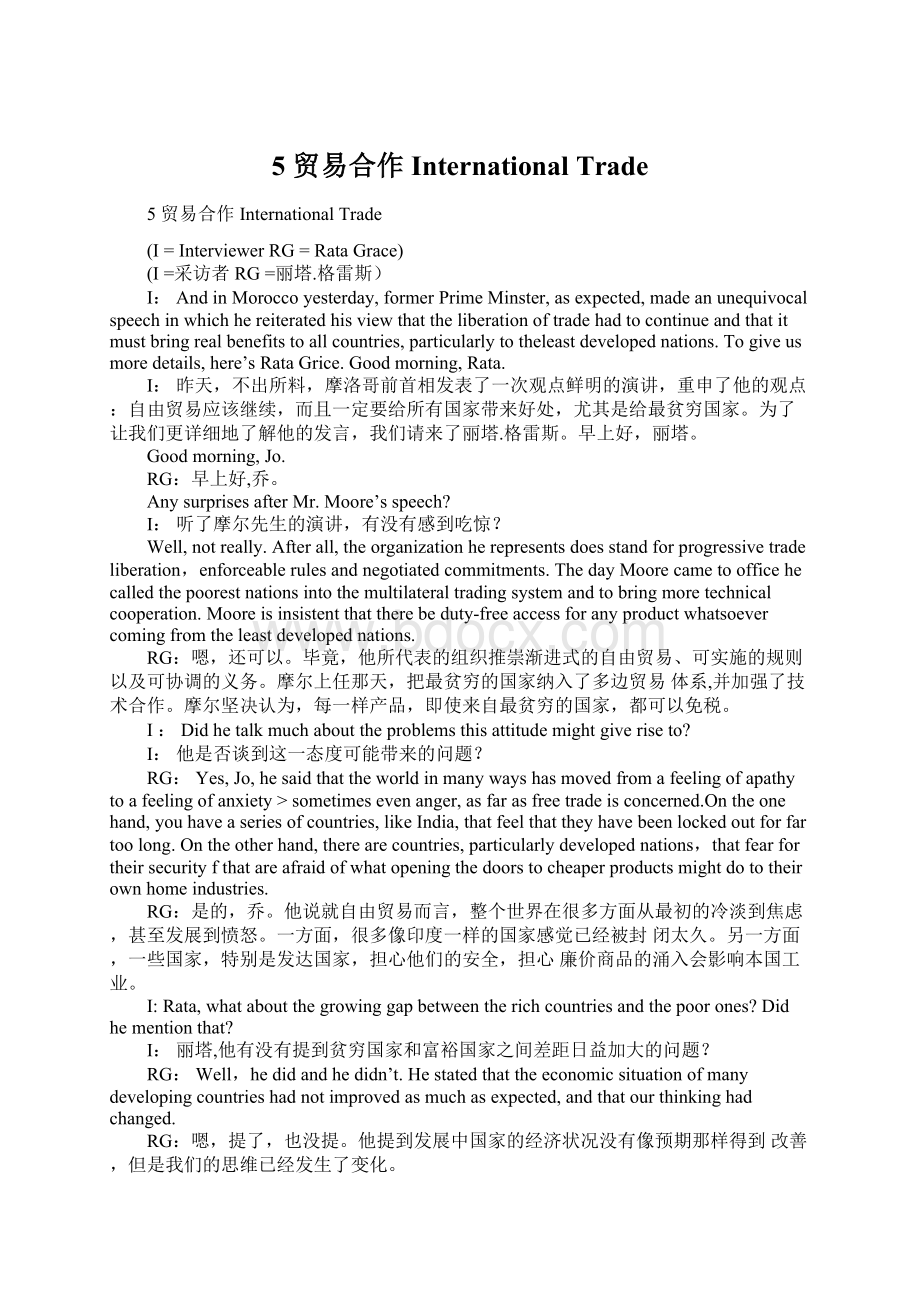5 贸易合作 International Trade.docx
《5 贸易合作 International Trade.docx》由会员分享,可在线阅读,更多相关《5 贸易合作 International Trade.docx(7页珍藏版)》请在冰豆网上搜索。

5贸易合作InternationalTrade
5贸易合作InternationalTrade
(I=InterviewerRG=RataGrace)
(I=采访者RG=丽塔.格雷斯)
I:
AndinMoroccoyesterday,formerPrimeMinster,asexpected,madeanunequivocalspeechinwhichhereiteratedhisviewthattheliberationoftradehadtocontinueandthatitmustbringrealbenefitstoallcountries,particularlytotheleastdevelopednations.Togiveusmoredetails,here’sRataGrice.Goodmorning,Rata.
I:
昨天,不出所料,摩洛哥前首相发表了一次观点鲜明的演讲,重申了他的观点:
自由贸易应该继续,而且一定要给所有国家带来好处,尤其是给最贫穷国家。
为了让我们更详细地了解他的发言,我们请来了丽塔.格雷斯。
早上好,丽塔。
Goodmorning,Jo.
RG:
早上好,乔。
AnysurprisesafterMr.Moore’sspeech?
I:
听了摩尔先生的演讲,有没有感到吃惊?
Well,notreally.Afterall,theorganizationherepresentsdoesstandforprogressivetradeliberation,enforceablerulesandnegotiatedcommitments.ThedayMoorecametoofficehecalledthepoorestnationsintothemultilateraltradingsystemandtobringmoretechnicalcooperation.Mooreisinsistentthattherebeduty-freeaccessforanyproductwhatsoevercomingfromtheleastdevelopednations.
RG:
嗯,还可以。
毕竟,他所代表的组织推崇渐进式的自由贸易、可实施的规则以及可协调的义务。
摩尔上任那天,把最贫穷的国家纳入了多边贸易体系,并加强了技术合作。
摩尔坚决认为,每一样产品,即使来自最贫穷的国家,都可以免税。
I:
Didhetalkmuchabouttheproblemsthisattitudemightgiveriseto?
I:
他是否谈到这一态度可能带来的问题?
RG:
Yes,Jo,hesaidthattheworldinmanywayshasmovedfromafeelingofapathytoafeelingofanxiety>sometimesevenanger,asfarasfreetradeisconcerned.Ontheonehand,youhaveaseriesofcountries,likeIndia,thatfeelthattheyhavebeenlockedoutforfartoolong.Ontheotherhand,therearecountries,particularlydevelopednations,thatfearfortheirsecurityfthatareafraidofwhatopeningthedoorstocheaperproductsmightdototheirownhomeindustries.
RG:
是的,乔。
他说就自由贸易而言,整个世界在很多方面从最初的冷淡到焦虑,甚至发展到愤怒。
一方面,很多像印度一样的国家感觉已经被封闭太久。
另一方面,一些国家,特别是发达国家,担心他们的安全,担心廉价商品的涌入会影响本国工业。
I:
Rata,whataboutthegrowinggapbetweentherichcountriesandthepoorones?
Didhementionthat?
I:
丽塔,他有没有提到贫穷国家和富裕国家之间差距日益加大的问题?
RG:
Well,hedidandhedidn’t.Hestatedthattheeconomicsituationofmanydevelopingcountrieshadnotimprovedasmuchasexpected,andthatourthinkinghadchanged.
RG:
嗯,提了,也没提。
他提到发展中国家的经济状况没有像预期那样得到改善,但是我们的思维已经发生了变化。
I:
Inwhatwayhasourthinkingchanged?
I:
发生了怎样的变化
RG:
Manypeoplenowrealizethattheliberalizationoffinancialandtraderelationshastobemanagedinawaythatalsoguaranteesstability.Yousee,theleastdevelopedcountries,arelargelydependentonasmallnumberofexportproducts.Whenthere,sacrisisliketheoilcrisisintheseventiesortheAsianCrisis,pricesforrawmaterialsfallandtheninternaldemandfalls.Indeed,thisoccurredinmanyoftheseleastdevelopedcountriesandledtopoliticalinstability,growingpovertyandsoon.Mooreregardspoliticalstabilityasbeingfundamental.Withoutit,hesays,there’llbenoinvolvement.
RG:
很多人现在意识到金融和贸易关系的自由化必须在稳定的前提下操作。
你知道,最不发达国家在很大程度上依赖于其为数不多的出口产品。
当出现某种危机像七十年代的石油危机或亚洲金融危机时,原材料价格下降,从而导致国内需求减少。
确实,这已经在许多最不发达国家里发生过,甚至导致政治不稳定、贫困增长等情况的出现。
摩尔把政治稳定看做是最基本的因素,没有它,就谈不上介不介入的问题。
I:
Sowhat’sthesolution?
I:
那么有什么解决办法吗?
RG:
Thereneedstobebetterincomedistribution,withincountriesaswellasamongcountries.Trade,accordingtoMoore,willnotansweralltheproblems,butitwillhelp,solongasallcountriesreceiverealbenefitandthatthisbenefitissharednotsquandered.Healsosaidthattechnicalassistancewasamustandthattherecouldneverbeenoughofit
HG:
不论是国内还是国外,收入应该得到更好地分配。
摩尔认为,贸易不能解决一切问题,但是,只要国家能得到真正的利益,而且只要这些利益得到合理分配,而不是被挥霍浪费,贸易还是会起到积极的作用。
他说,必须要有充足的技术支持,这一点永远都不能停止。
I:
Didhedealwithanysectorsinparticular?
I:
.他有没有特别地针对某些领域?
RG:
Well,asalways?
textileandagriculturewereontheagenda.Tariffsarestilltoohigh,andoneoftheotherproblemsisthatthesesectors,particularlyagriculture,arenotdoingtoowell,eveninthedevelopednations,sotheremaywellbeassistancetochangingtherules.
RG:
嗯,与往常一样,纺织业和农业已经进入议事日程。
关税还是太高,另一个问题就是这些领域,特别是农业发展得并不是很好,甚至在发达国家也是如此,所以很可能需要一些帮助来改变这些规则。
I:
Andsometimestherulesdon’tseemtobethesameforeveryone.
I:
规则并不适用于每个国家。
RG:
Indeed.Mooresaidthathewantedrulestobecomemoreusefulandpracticalfordevelopingcountries.Atpresent,rulesarenotalwaysworkableandMoorepointedoutthatarbitrationwasmorecostlytosomecountriesthantoothers,whichwasunfairandhadtobecorrected.
RG:
的确如此。
摩尔提出,他想让这些规则对发展中国家更为有益和实用。
目前,规则并不能解决一切问题。
摩尔指出,对于一些国家而言,仲裁费用相对较高,这是不公平的,应该予以纠正。
I:
Canyousumupthekeyideasinafewwordsforus.Rata?
I:
丽塔,你能用几句话总结一下吗?
RG:
Well,firstofall,thereisameanstoanend,notanendinitself.Secondly,tradewillraisestandardsoflivingifthingsaredonefairly.Inotherwords,marketaccesswillnotbeabletodothejobonitsown,thebackingofcapital,training,infrastructureandsolid,soundgovernmentsareessentialtorealprogress.
RG:
嗯,首先,达到一个目的总有一个方法,但并不是目的本身。
其次,如果公平分配,贸易会提高生活水平。
换句话说,进入市场并不能解决问题本身,资金支持、培训、基础设施以及稳定健全的政府对于真正的进步都是必不可少的。
Meaningfulwordsindeed.Thankyou,Rata.
I:
丽塔,你总结得真好,谢谢。
样例欣赏2
ArmandBasiistheownerofatextilecompanyinSpain.Heisexpressinghisopiniononhowthetextileindustryinhiscountryisaffectedbyfreetrade.
阿曼德.倍西是西班牙的一个纺织公司的业主。
对于纺织业如何受到自由贸易的影响这一问题,他在阐述其观点。
(I=InterviewerAB=ArmandBasi)
(I=采访者AB=阿曼德.倍西)
I:
Inthetextilesectorthereisoftenalotoftalkaboutfreetradeandprotectionism.Howhavethingschanged?
I:
在纺织行业,经常有很多人谈论自由贸易和保护主义。
有怎样的变化呢?
AB:
Well,intheworldoftextiles,protectionismisstilltobefound,mainlyinthosecountriesinwhichthetextileindustryispartofthebasiceconomicstructure.Theworldisheading,though,tocompleteliberalizationofthemarkets.InSpain,forexample,thetextilesectorhasalwaysbeenveryimportantandyetthemarkethasbeenafreeoneforanumberofyears.
AB:
嗯,在纺织行业,保护主义仍然可以看到,主要是在把纺织业作为国家基本经济结构的一部分的地区。
然而,整个世界正在走向市场的完全自由化。
例如,在西班牙,纺织行业一直非常重要,可很多年以来市场一直都很自由。
I:
Doestheworldmarket,theglobalizedmarketplace,offerguaranteestotheconsumer?
Isitgoodforeveryone?
I:
世界市场--全球化的市场是否给消费者提供了保障?
是否对每个人都有好处?
AB:
Well,globalizationis,infact,aresultofmodernmeansofcommunication.So,itis,really,atrendthatsimplycannotbestoppedinaworldoffreedomanddemocracy.Anddependingonthetypeofproductandthelocalcircumstances,countrieswillbeaffectedinonewayoranother.
AB:
嗯,实际上,经济全球化是现代通讯工具发展的结果。
因此,这确实是在一个自由和民主的世界里无法停止的一个趋势。
而且,因为这些国家依赖产品类型和当地环境,所以他们无论如何都会受到影响。
I:
Butareconsumerrightsguaranteed?
I:
但是消费者的权利是否能得到保障呢?
AB:
That,sabigquestion.Ithinkthatinthelongterm,theconsumerwillbetheking,aswesayhere.Theremaybemomentswhenthere’salossofquality?
butintheendthebalancebetweenqualityandprice,thesearchforthebestrelationshipbetweenqualityandpricewillbedecisive.Ifamanufacturerordistributoracceptsinferiorquality,theyruntheriskoflossofimage,andthatcanbeverycostlyindeed.
AB:
这是一个大问题。
如我们所言,我认为从长期的角度来看,消费者就是国王。
可能有些时候,质量得不到保障,但是最终质量和价格之间的平衡和寻求质量和价格间的最佳关系确实是决定性的。
如果某个制造者或分销商接受伪劣质量的商品,他们就冒着失去良好形象的风险,代价是巨大的。
I:
Whatdoyouseeasbeingthefutureofthetextileindustryinthemoreindustrializedcountries?
I:
那么你认为工业较发达国家的纺织行业的未来发展前景如何?
AB:
Well,tobehonest,Ithinkthatsomeofthepredictionsmadeafewyearsbackwillnotcomeabout.Yousee,manypeoplethoughttheglobaldivisionoflaborwouldlowercostandthatfactorieswouldmovedependingonthecompetitiveadvantageonecountryoranotherhadtooffer.Butinfacttherealitycanbecostlyandcomplex.Thekey,nowadays,istogetyourproducttomarketasfastaspossible.Thelogisticsinvolvedinglobalizingthemanufacturingprocessesarecomplex:
shipping,timing,coordinationanddistribution.Imean,youcan,tairfreight,it,stoocostly.Inaddition,whenyousetupplantsinothercountries,youneedtohaveyourowntechnicalstaffonsite,whichinvolvesadditionalcosts—accommodationexpenses—no,it,snotworkingoutthewaysomepeoplehadanticipatedandIdon’tthinkiteverwill.
AB:
嗯,坦率地说,我认为一些几年前做出的预测并没有实现。
你知道,许多人认为,劳动力在全球范围内的分工会降低成本,而且,工厂厂址的变更要看一个国家所提供的竞争优势。
但是,事实上,现实是残酷和复杂的。
目前,关键是尽快把你的产品推向市场。
制造过程全球化所涉及的统筹安排包括以下几个复杂的部分:
运输、定时、协调和分销。
我这里想说的是,你不能空运,价钱太高。
另外,当你在其他国家建立工厂时,你需要有你自己的现场技术人员,这也涉及额外费用,如住宿费用。
事情永远不会像有些人想像得那么简单。
I:
Sowhatdoyouthinkwillhappen?
I:
那么,你觉得会怎样呢?
AB:
Ithink,quitesincerely,thatthefutureifthetextileindustryinthemoredevelopednationsliespreciselytheareaofindustrialization—innovation?
thecreationofnewmaterialsandfabrics,newmachines,creativedesign,themanufacturingofitemswithhighaddedvalue,andagileservice.Inotherwords,reachingtheconsumerquicklymeanskeepingtheconsumersatisfied.Onlytheindustrializednationscan,atpresent,haveresourcesavailabletoinnovateinthisway.Thecontributionofthedevelopingnationswillbelimitedtolabor.
AB:
我非常真诚地认为,较为发达国家的纺织业的未来前景在于工业化的领域--创新、新材料和纤维、新机器、创造性设计、高净增值商品的生产以及灵活的服务。
换句话说,迅速达到消费者的需求就是使消费者满意。
目前,只有工业化的国家才能拥有可利用的资源进行创新。
发展中国家的贡献仅限于提供了大量的劳动力。
经典句型
Hecalledthepoorestnationsintothemultilateraltradingsystemandtobringmoretechnicalcooperation.
他把最贫穷的国家纳入了多边贸易体系,并加强了技术合作。
Mooreisinsistentthattherebeduty-freeaccessforanyproductwhatsoevercomingfromtheleastdevelopednations.
摩尔坚持认为,每一样产品,即使来自最贫穷的国家,都可以免税。
Hesaidthattheworldinmanywayshasmovedfromafeelingofapathytoafeelingofanxiety?
sometimesevenanger,asfarasfreetradeisconcerned.
他说就自由贸易而言,整个世界在很多方面从最初的冷淡到焦虑,甚至发展到愤怒。
Ontheotherhand,therearecountries,particularlydevelopednations,thatfearfortheirsecurity,thatareafraidofwhatopeningthedoorstocheaperproductsmightdototheirownhomeindustries.
另一方面,一些国家,特别是发达国家,担心他们的